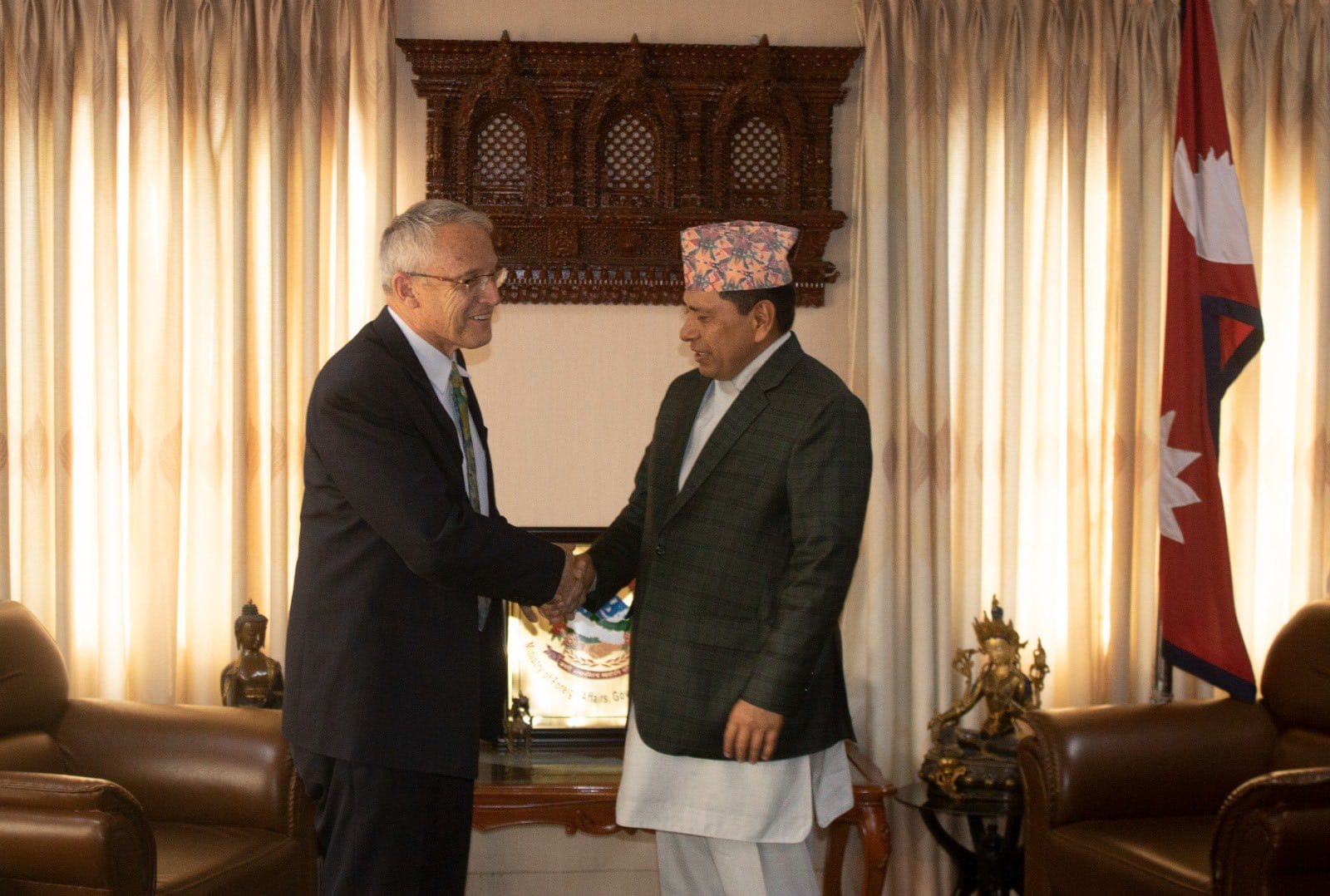Israel
Nepal & Israel: ties in new changing context

Ambassador of Israel to Nepal Mr. Hanan Goder-Goldberger paid a courtesy call on Deputy Prime Minister and Minister for Foreign Affairs Narayan Kaji Shrestha. Various aspects of Nepal-Israel relations and cooperation were discussed on the occasion.
© Via Ministry of Foreign Affairs, NepalBilateral ties between Nepal and Israel have been cordial since their establishment in 1960, given that Nepal's immediate neighbor nations like India, China and others had not recognized the state of Israel at the time. Nepal voted in favor of Security Council Resolutions 242 (1967) and 338 (1973), which upheld the right of all states (including Israel) in the region to live in peace. Whilst Nepal has supported Israel’s right to exist as an independent country, it also has favored the two-state solution and called for the protection of human rights in Palestine. This aligns with its commitments as a signatory to several Human Rights Conventions and the principle of the United Nations Charter.
Nepal-Israel relations created opportunities for cooperation in agriculture, science and technology, trade (the total trade between Nepal and Israel surpasses $9 million, though skewed largely in Israel’s favor), tourism and foreign employment among other avenues; the two maintain a common position in major international forums, and are committed to enhancing intercultural ties through the exchange of students, scientists and health professionals, the training and management of Nepali agriculture professionals and consultation with Israeli experts across different fields. Over 4,500 Nepali caregivers (mostly women) currently live and work in Israel.
The surprise attack by Hamas militants on Israel on October 7, 2023, sent a shock wave across the world as well as Nepal. Ten Nepali university students, who were pursuing higher education in agriculture and other fields in Israel, lost their lives at the hands of Hamas militants, with at least a dozen others sustaining injuries. Bipin Joshi, a Nepali youth, has been missing since October 7. Nepal seeks support and intervention from Qatar and the United States for Joshi's safe release from Hamas captivity. With a number of its citizens directly affected by the October 7 attack, the government of Nepal promptly and strongly condemned it and conveyed its solidarity with the government of Israel.
The Israeli government recently began providing long-term financial support to the families of the ten Nepali nationals who were killed in the October 7 attack. The Israeli government has also begun providing financial compensation to the family of Bipin Joshi, who is believed to be held hostage by Hamas in Gaza since October last year. The amount of the financial assistance, however, remains undisclosed by the Israelis.
The Nepalese government, despite its dwindling popularity, carefully managed to address the outrage within the country at the killing of the ten Nepalis, the incident being a grim reminder of the killing of 12 of its nationals in Iraq in 2004. At the public level, a number of individuals and organizations expressed solidarity with the Israeli people, lighting lamps in Hindu and Buddhist temples and across cities in remembrance of those who lost their lives during the war between Israel and Hamas.
Despite Nepal’s agreement with Israel’s position on Hamas, Nepal is also aware of the repercussions its support might have on Nepali migrant workers currently living and working in Gulf nations such as the UAE, Saudi Arabia, Qatar, Kuwait, Oman and Bahrain. As a remittance-dependence economy, Nepal must balance the economic interests and concerns of its migrant workers with its stance on Israel.
Its support for Israel has not prevented Nepal from expressing concerns over the killing of innocent civilians in Gaza and calling for a ceasefire. Nepal also upheld the two-state solution to resolve the protracted crisis between Israel and Palestine. Amid escalating bombings in Gaza, Prime Minister Pushpa Kamal Dahal of Nepal, in contrast to Nepal's official stance, publicly expressed support for the Palestinian cause. He views Palestine as an oppressed group who deserve independence and stressed the importance of international recognition for both Israel and Palestine.
Despite the fluctuations in positions and evolving dynamics in West Asia, given Nepal's role as a significant labor-exporting country, its relations and stance towards Israel are delicate and require careful handling. Any unexpected change in the situation in West Asia could lead to millions of Nepali migrant workers returning home, causing job scarcity, social unrest and economic upheaval. While navigating this crisis, Nepal must adopt a careful, nuanced and balanced approach to safeguard its interests.
